八年级英语上册 Unit5《Can you come to my party》单元检测 人教新目标版
初中英语《Unit5Canyoucometomyparty》单元教学设计以及思维导图
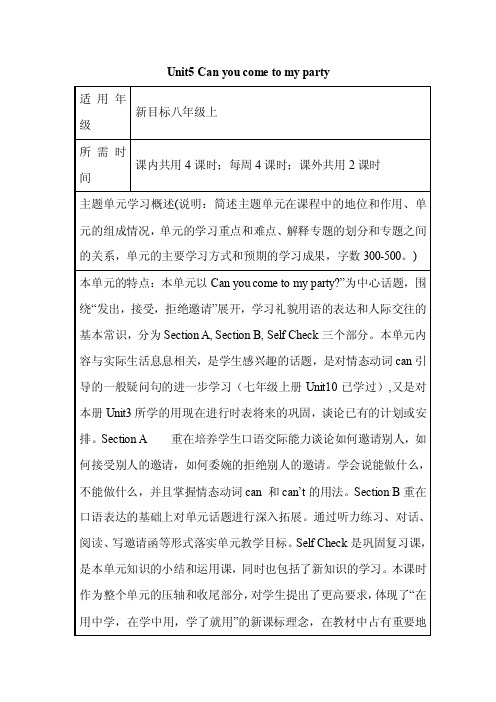
1.本节课教学设计实施效果良好,调动了学生学习英语的
积极性,活跃了课堂的气氛。
2、对学生能及时的进行精神的鼓励,提高了学生参与活
动的积极性。
3、在本节课的教学过程中,本人采用情景教学法和鼓励
学生采用小组合作方式进行学习。课堂教学必须以学生为 评价要
主体,教师要鼓励学生大胆、积极地参与各项教学活动, 点
主题单元学习目标 知识与技能: 依据新课标要求和本单元、本课时的特点,制定以下教学目标: 1. 知识目标:掌握重点短语和重点句型:study for a test,help my parents,visit my aunt,go to the doctor,go to the guitar lesson,play soccer,go to the mall,go to the movies,go to my cousin’s birthday party,babysit my sister,have tennis training 等。Can you come to my party?Sure,I’d love to./I’m sorry, I can’t. I ... . 2. 能力目标 a.根据日程表安排写回信,提高学生写作水平。 b.培养语言表达能力,合作沟通能力,归纳概括能力,分析解决问题 能力。 3. 情感目标 培养学生使用礼貌用语的能力,学会真诚、坦然与他人相处。。 过程与方法:在整个单元教学中,通过锻炼学生的听说读写能力,让
Unit5 Can you come to my party 适用年
新目标八年级上 级
所需时 课内共用 4 课时;每周 4 课时;课外共用 2 课时
间
主题单元学习概述(说明:简述主题单元在课程中的地位和作用、单 元的组成情况,单元的学习重点和难点、解释专题的划分和专题之间 的关系,单元的主要学习方式和预期的学习成果,字数 300-500。) 本单元的特点:本单元以 Can you come to my party?”为中心话题,围 绕“发出,接受,拒绝邀请”展开,学习礼貌用语的表达和人际交往的 基本常识,分为 Section A, Section B, Self Check 三个部分。本单元内 容与实际生活息息相关,是学生感兴趣的话题,是对情态动词 can 引 导的一般疑问句的进一步学习(七年级上册 Unit10 已学过),又是对 本册 Unit3 所学的用现在进行时表将来的巩固,谈论已有的计划或安 排。Section A 重在培养学生口语交际能力谈论如何邀请别人,如 何接受别人的邀请,如何委婉的拒绝别人的邀请。学会说能做什么, 不能做什么,并且掌握情态动词 can 和 can’t 的用法。Section B 重在 口语表达的基础上对单元话题进行深入拓展。通过听力练习、对话、 阅读、写邀请函等形式落实单元教学目标。Self Check 是巩固复习课, 是本单元知识的小结和运用课,同时也包括了新知识的学习。本课时 作为整个单元的压轴和收尾部分,对学生提出了更高要求,体现了“在 用中学,在学中用,学了就用”的新课标理念,在教材中占有重要地
新目标八年级上Unit5 Can you come to my party评课稿

新目标八年级上Unit5 Can you come to my party?评课稿一、评教学内容:该教师上课的题目是:八年级上Unit5 Can you come to my party?(Section A 1a—2c,Grammar Focus)这是一节新课。
主要围绕如何向别人发出邀请,如何接受别人的邀请及如何说明理由,并学会安排自己的日程这一功能项目。
提供给学生向别人发出邀请、接受、回绝邀请和说明理由的日常交际用语。
同时引出语言项目have/has to do sth. I’m doing sth. I am going to do sth. 徐老师很好的贯彻了“在用中学,学中用,学用结合,学以致用”的原则。
同时体现了以学生为主体,教师为主导的新课程理念。
二、评教学设计和教法:徐玲娣老师的课堂设计巧妙,教学设计贴近学生的实际,不断给学生提供着语言支架,注重根据学生的基础,去挖掘他们原有的知识资源,教师用TPR活动导入新课,在活动中学,取代了过去机械的操练,使学生的注意力在最短的时间里被激活,接师利用游戏引出新词教学,自然有效,通过match ,playing games ,pair work, group work ,discuss, listening practice ,exercise,分散了本课的难点。
老师教得容易,学生学得轻松,提高了实效性,教师有意识地帮助学生形成适合自己的学习策略,采用科学的途径,提高学习效率。
三、评教师教学过程:1. 良好的开头对一堂课的成功与否,起着关键的作用。
本堂课一开始,教师就设计I’m sailing.歌曲,使学生快速沉浸于在歌曲中,活跃了英语课堂气氛,学生在获取有声信息的同时,轻松地巩固所学的语言项目:be doing sth. 表达将要做某事。
2. 教师充分利用现代教育技术,开发英语教学资源,拓宽学生学习渠道,改进学生学习方式。
这节课教学流程自然,思维活跃,而且老师给了学生一些空间,让学生充分发挥想象。
新目标八年级英语上册Unit5 Can you come to my party?讲解与练习
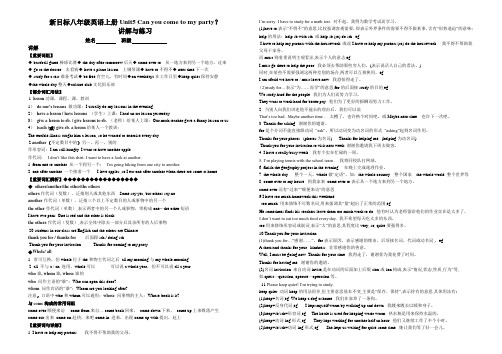
新目标八年级英语上册Unit5 Can you come to my party?讲解与练习姓名班级讲解【重要词组】◆ baseball game棒球比赛◆ the day after tomorrow后天◆ come over to从一地方来到另一个地方,过来◆ go to the doctor去看病◆ have a piano lesson上钢琴课◆ have to不得不◆ next time下一次◆ study for a test准备考试◆ be free有空儿,有时间◆on weekdays在工作日里◆keep quiet保持安静◆the whole day整天◆culture club文化俱乐部【部分词汇用法】1. lesson功课,课程,课,教训1). do one’s lessons做功课:I usually do my lessons in the evening.2). have a lesson / have lessons(学生)上课:I had an art lesson yesterday.3). give a lesson to sb. / give lessons to sb.(老师)给某人上课:Our math teacher gave a funny lesson to us. 4). teach (或) give sb. a lesson给某人一个教训:The terrible illness taught him a lesson, so he wanted to exercise every day.2.another(不定数目中的)另一,再一,别的作形容词:I am still hungry. I want to have another apple.作代词:I don’t like this shirt. I want to have a look at another.1. from one to another 从一个到另一个:I’m going hiking from one city to another.2. one after another 一个接着一个I love apples, so I eat one after another when there are some at home.【重要词汇辨析】◆◆◆◆◆◆◆◆◆◆◆◆◆◆◆◆◆◆others/another/the other/the othersothers作代词(复数),泛指别人或其他东西Some say yes, but others say no.another作代词(单数),泛指三个以上不定数目的人或事物中的另一个the other作代词(单数),表示两者中的另一个人或事物,常构成one…the other短语I have two pens. One is red and the other is black.the others作代词(复数),表示全体中除去一部分后其余所有的人后事物20 students in our class are English and the others are Chinese.thank you for / thanks for 后面跟sth./ doing sth.Thank you for your invitation. Thanks for coming to my party.◆Whole/ all1. 常可互换,但whole位于the和物主代词之后all my morning与my whole morning2. all 不与a / an 连用,whole可以可以说a whole year,但不可以说all a yearwho谁, whom谁, whose谁的who 问作主语的“谁”:Who can open this door?whom 问作宾语的“谁”:Whom are you looking after?注意:口语中who和whom可以通用;whose 问事物的主人:Whose book is it?与come构成的常用词组come over顺便来访come from来自… come back回来,come down下来,come up上来败落产生come out出来come on赶快,来吧come in 进来,出现 come up with提出,赶上【重要词句详解】1.I have to help my parents . 我不得不帮助我的父母。
人教版八年级英语上册5-12单元知识点(词汇+句型+固定搭配)
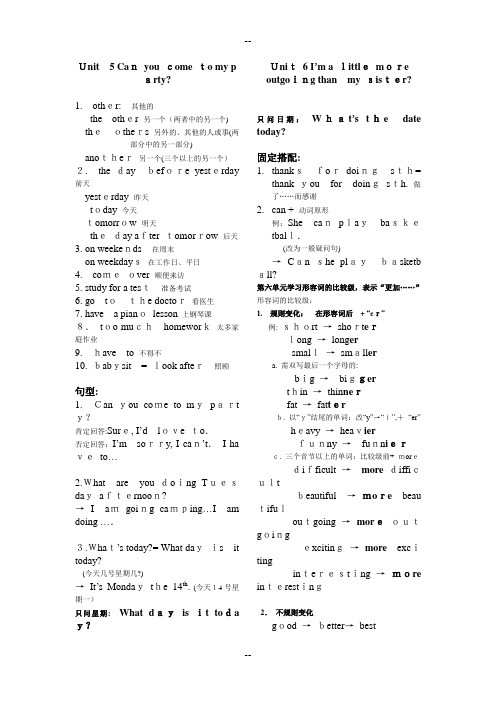
Unit 5 Canyou come to my party?Unit 6 I’m a littlemore outgoing than my sister?1.other:其他的the other 另一个(两者中的另一个)theothers 另外的、其他的人或事(两部分中的另一部分)another另一个(三个以上的另一个)2.the daybefore yesterday 前天yesterday 昨天today 今天tomorrow 明天theday after tomorrow 后天3. on weekends在周末on weekdays在工作日、平日4.comeover 顺便来访5. study for a test准备考试6. go tothe doctor看医生7. have a pianolesson上钢琴课8.too muchhomework太多家庭作业9.have to 不得不10. babysit= look after照顾句型:1.Can you come to mypart y?肯定回答:Sure, I’d love to.否定回答:I’m sorry, I can’t.I ha veto…2.What are you doing Tuesdayafternoon?→I amgoing camping…I am doing ….3.What’s today?= What dayis it today?(今天几号星期几?)→It’s Mondaythe 14th.(今天14号星期一)只问星期:What dayis it toda y?只问日期:What’s the date today?固定搭配:1.thanksfordoingsth=thank you for doingsth. 做了……而感谢2.can + 动词原形例:She canplaybasketball.(改为一般疑问句)→Can she playbasketb all?第六单元学习形容词的比较级,表示“更加……”形容词的比较级:1.规则变化:在形容词后+ “er”例: short →short erlong →long ersmall→small era. 需双写最后一个字母的:big →biggerthin →thin nerfat →fat terb. 以“y”结尾的单词:改“y”→“i”,+“er”heavy →heavierfunny →funn ierc. 三个音节以上的单词:比较级前+ moredifficult →more difficultbeautiful→more beau tifuloutgoing →moreoutgoingexciting→more excitinginteresting →more interesting2.不规则变化good →better→bestbad→worse→worst词汇:1.than比2. as 如同…一样the same as 与……一样as +形+ as:与……相比一样notas +形+ as与…相比不如…= not so + 形+as与…相比不如…3. both 两者都例:they both=bothofthem 他们两个4. have something in common 有共同点5. be goodatdoing sth=dowell in doing sth擅长于做…事句型:1.Tina isshorter than Tara.2.Tinais more athletic thanTara.3.She isa little more outgoingthanme.她比我更外向一点点。
八年级上册英语Unit5-can-you-come-to-my-party知识点总结
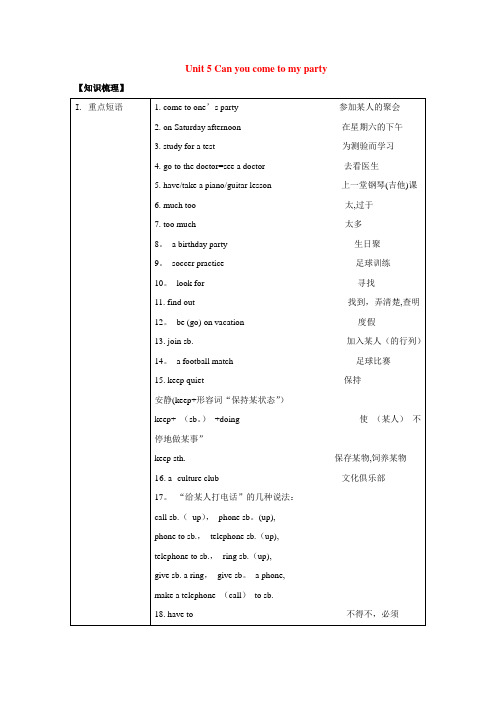
Unit 5 Can you come to my party【知识梳理】I. 重点短语 1. come to one’s party 参加某人的聚会2. on Saturday afternoon 在星期六的下午3. study for a test 为测验而学习4. go to the doctor=see a doctor 去看医生5. have/take a piano/guitar lesson 上一堂钢琴(吉他)课6. much too 太,过于7. too much 太多8。
a birthday party 生日聚9。
soccer practice 足球训练10。
look for 寻找11. find out 找到,弄清楚,查明12。
be (go) on vacation 度假13. join sb. 加入某人(的行列)14。
a football match 足球比赛15. keep quiet 保持安静(keep+形容词“保持某状态”)keep+ (sb。
)+doing 使(某人)不停地做某事”keep sth. 保存某物,饲养某物16. a culture club 文化俱乐部17。
“给某人打电话”的几种说法:call sb.(up),phone sb。
(up),phone to sb.,telephone sb.(up),telephone to sb.,ring sb.(up),give sb. a ring,give sb。
a phone,make a telephone (call)to sb.18. have to 不得不,必须19。
the day after tomorrow 后天20。
a science report 科学报告II. 重要句型邀请用语1. Can you come to my party?= Would you like to come to my party?肯定回答:Sure,I’d love to。
八年级英语上册 Unit 5《Can you come to my party》教案 人教新目标版

Unit 5 Can you come to my party?I. Analysis of the Teaching Material1.Status and FunctionThe topic of this unit is about invitation. It teaches the students how to give or receive an invitation. It’s close to the everyday life. So we’d better raise the students learning interest first.2.Teaching aids and demands(1)Knowledge ObjectsStudents must learn to make invitation. They must learn to say yes and say no to aninvitation and give their reasons.(2)Ability ObjectsTo improve the students’ ability of listening, speaking, reading, writing.(3)Moral ObjectsWe teach this lesson in order to learn how to accept or refuse an invitation of foreigncountries politely. It will teach the students good manners. If he or she holds a partyat home, He or she will feel happy when they can do something for others.(4)Teaching Key PointsThe key vocabulary and the key phrases of this unit(5)Teaching DifficultiesUsing the target language to improve the abilities of the studentsII. Target languageCan you come to birthday party?Yes, I’d love to.Sorry, I can’t. I have to look after my mother.When is the party?It’s at six on Monday.III. VocabularyTomorrow, weekday, invitation, match, whole, whom, another, concert, pity, free, American,Chemistry, training…IV. Learning StrategiesInductingCooperatingV. Teaching procedures.It includes five periods. (5个课时)The First PeriodI. Teaching Aims and DemandsKey vocabulary and phrasesTarget languageTo improve the students ability of Listening and speakingII. Teaching Key Points(1) Key PhrasesStudy for a test, have a piano lesson, go to the doctor, visit my aunt (2) Target language_ Can you come to my party on Sunday?_ Sure, I’d love to._ Can you come to my party on Sunday?_ Sorry, I have too much homework this weekend.I have to help my mum.I have to go to the doctor.III. Teaching DifficultiesUsing the target language to practice the oral English in pairsIV. Teaching MethodsCommunicative methodsPairworkV. Teaching Aids多媒体VI. Teaching ProceduresStep 1Before the class, let the students listen to the music, this can guide to the new lesson. Afterthis, ask thestudents to watch the movie, this can guide to the target language.Step 2 (1a)Learn the phrases and do the exercise in 1a.The answer is: b, d, a, c, eStep 3 (1b and 1c )First let the students read the dialogue in the picture. Then listen to it. (This activity provides guided oral practice using the target language). After the listening practice, ask the student to practice some invitations and refusals.Step 6 (Blackboard design)Unit 5How about…? politeWhat about…? impolite The second periodI Teaching aims and demands1. Knowledge ObjectsKey vocabularyTarget languageGrammar focus2. Ability Objects_ ListeningII. Teaching key points1. key vocabularyhey, baseball game, too much homework2. Target languageA: Hey, Dave! Can you come to the movies on Saturday? B: I’m sorry, I can’tI have too much homework.I have to help my mum.I have to go to my guitar lesson.I have to visit my aunt.III Teaching difficultiesGrammar focusIV Teaching methodsListening and speaking methods.Communicative approachPairwork.VI Teaching procedureStep IGreet the class and check the homeworkStep II (2a)First, make the preparation for listening. Read the sentences twice to the class. The first time you can read “can”, the second time you can read “can”. Then let the students listen .The answers for activity 2a are : 1. can’t , 2.can 3. can’t 4. can’t 5.canStep III (2b)Ask a student to read the sentences in the box.. Tell the students these are the reason why people can’t go to the party. Listen to the recording again and number the reasons 1~3 why they can’t go to the party .The answers are : a . 2 d . 3 e . 1Step IV (2c)This is an oral practice about the target the language . You can ask the student if they can give other reasons besides the ones in 2a . If they can, make a dialogue in pair . ( First , ask two who can do it well to make a model dialogue , then let them do it in pairs .Step V . ( Grammar focus)First , let the students read the sentences in the grammar box . Then write “ have to , has to ” on the blackboard , and tell them they are used to say no to an invitatio n . And then write “ be going to do something ” on the blackboard , tell the students we can say no to an invitation by talking about the future plan . After that , let them do exercises in order to master to the grammar .Step V. Blackboard designUnit 51. have to /has to + verbThey have to go to the acting lesson on Sunday.Lucy has to help her mom with the housework.Do they have to go to the acting lesson on Sunday.Yes, they do. / No, they don’t.Does Lucy have to help her mom with the housework?Yes, she does. / No, she doesn’t.2. Can you come to…? Sure, I’d love to. / Sorry, I can’t. I haveto…Can she come to…? No, she can’t. She has to…Step VI . HomeworkPlease write as many reasons as you can to refuse an invitationThe Third PeriodI Teaching aims and demands1. Vocabulary and phrases Oral practice2. Ability objectsReading, writing, communicative competenceII. Teaching key PointsReview vocabulary items and grammar focusIII. Teaching difficultyOral practice using the target languageI. Teaching methodsReading, writing methods and communicative approachV. Teaching proceduresA computerVI. Teaching proceduresStep IGreet the class and let a student to make a duty report. And then check the homeworkStep II (3a writing)Show the invitation in 3a to the students. Ask the students to fill in the blanks according to the information of the invitation.The answers are: can, party, when, on Friday, June 30 4:30Step III (oral practice)Practice the dialogue in 3a in pairs and then let some of the act the dialogue.Step IV (writing)Let the students fill in the card with details of an event. Then call your friends and invite them to the event.Step V Invite a friend (oral practice)Tell the students how to do the activity: Student A, you are Eliza. Look at page 82. Eliza , invite Lu Qing to go to the mall . Look at the calendar for this week and find a time when you can both go there.Use the dialogue in the box to start the activity , and then ask more questions to learn when both people aren’t busy . Help students to start the work, give them a hand if needed.The answers: Lu Qing and Eliza are both free on Wednesday afternoon , Friday afternoon , Saturday and SundayStep VI. SummaryToday we have learnt how to write an invitation and done a lot of practice.Step VII HomeworkGive your best friend an invitation to an event.The student who receives it must give a reply.Step III . Blackboard designUnit 51. Lu Qing and Eliza are both Free on :2. have fun /have a great timeWednesday afternoon 3. join/take part inFriday afternoon 4. have a piano lessonSaturday have a swimSunday have a lookThe Fourth Period I. Teaching aims and demands.Target languageOral practiceII. Ability objects.Listening skillSpeaking skillCommunicative competenceIII. Teaching key points1.Key vocabulary.Sunday, Monday, Tuesday, Wednesday, Thursday, Friday, Saturday Yesterday, today, tomorrow, the day after tomorrow2.Target language.What’s today?It’s Monday the 14th.Can you play tennis with me?When?Today.Sorry, I can’t.IV. Teaching difficulties.The target languageV. Teaching methods.Listening and speaking methods.VI. Teaching aids.A calendarA computerVII. Teaching procedure.Step 1Greet the class and check the homework.Step 2 (Section B 1a)Show the students a calendar, and ask a student to point out today’s date. Point to the number which shows the dates, and ask the students to copy them into the calendar in their book.Read the dates and let the students read after you.Step III (1b)1.Show the words on the screen:Yesterday, today, tomorrow, the day after tomorrow, weekday2.Let the students write the words below the correct days on the calendar in 1a.Step IV (1c)First ask two students to read the dialogue in the box. Then let them practice it in pairs by using the calendar in 1a.Step IX Blackboard designThe Fifth period I. Teaching aims and demands.1. Knowledge objectsE-mail messageWriting practiceReading practice2Ability objectsReading and writing skillCommunicative competenceII. Teaching key pointsReading passage主语+verb+-ing I have to…III. Teaching difficultiesReading and wring practice.IV. Teaching methodsReading and writing methods and communicative approach.V. Teaching aidsA calendarVI. Teaching proceduresStep 1Greet the class, do the duty report.Step 2 (3a )First, read the e-mail message to the students. Ask the students if they have any questions.If they do, answer them. Then let the students fill in the calendar on the book. After this, explain the key language points to them.Language points:1. Thank you for… (为……表示感谢)Thank you for helping me.Thank you for your invitation.2On ( 在某天,在某天的上午、下午或晚上)I’m going to the dentist on Sunday.Unit 5Sunday, Monday, Tuesday, Wednesday, Thursday, Friday, Saturday The____ the_____ the_____ the______ the_____ the____ the_____ Yesterday, today, tomorrow, the day after tomorrowOn Friday afternoon, I often play soccer.The answers to the calendar are:SundayMonday Cousin’s birthday partyTuesday Go to the dentistWednesdayThursday Tennis trainingFriday Study for the chemistry testSaturday Go to the moviesStep 3 (3b)First, tell the students when we talk about our future plans, we often use: I’m+verb+ing When we talk about what we must do, we use have to.Ask the students to fill in the blanks in 3b.The answers are: shopping, go to see, a test, I’m going, my family.Step 4 (3c)Let the students write an e-mail message to a friend. Say why you can’t visit next.Before the exercise, ask the students to give some possible answers and write them on the blackboard. So the students will feel easy to finish the writing exercise. After they finish it, Let them to correct it in groups first. Each group chooses theirs best one to read in front of the whole class.Step 5 ( planning a party )First read the conversation in the box together. Then ask the students to turn to page 88. Write down everything you have to do next week. Write in all the things you have to do .Ask the students to look at the list. Ask them “What day are you free?” This is when you can have your party.Step 6 (Self check 1 )Let the students to fill in the blanks with the words given. Change the forms of the words if possible. Then make their own sentences. The answers are: visit, playing, have to, study, comeStep 7 (Self check 2)Imagine you are Marie. Read the information and look at your schedule. Write replies to the invitation.VII. Summary and homeworkToday we have learnt how to write a e-mail to a friend. You can write another one to your frien after class.Step 8 Blackboard designUnit 51. Thanks for…2. on Sunday at 4:00Thanks for helping me. I’m going to the dentist on Sunday.Thanks for your invitation. I often get up at 4:00.。
八年级英语上册 Unit 5 Can you come to my party 人教新目标版
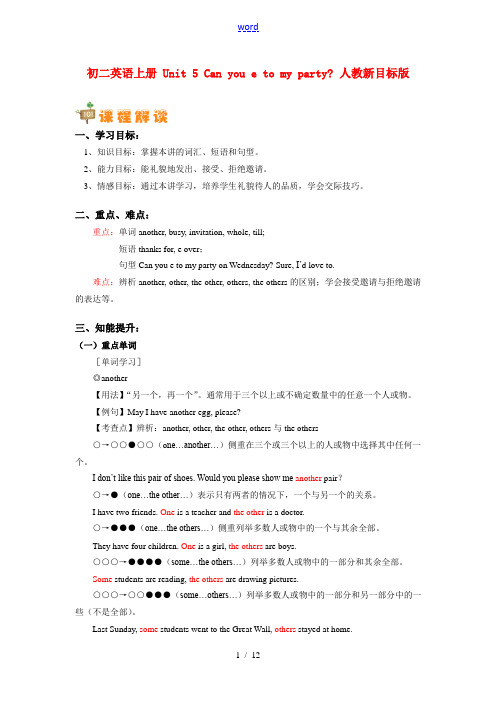
初二英语上册 Unit 5 Can you e to my party? 人教新目标版一、学习目标:1、知识目标:掌握本讲的词汇、短语和句型。
2、能力目标:能礼貌地发出、接受、拒绝邀请。
3、情感目标:通过本讲学习,培养学生礼貌待人的品质,学会交际技巧。
二、重点、难点:重点:单词another, busy, invitation, whole, till;短语thanks for, e over;句型Can you e to my party on Wednesday? Sure, I’d love to.难点:辨析another, other, the other, others, the others的区别;学会接受邀请与拒绝邀请的表达等。
三、知能提升:(一)重点单词[单词学习]◎another【用法】“另一个,再一个”。
通常用于三个以上或不确定数量中的任意一个人或物。
【例句】May I have another egg, please?【考查点】辨析:another, other, the other, others与the others○→○○●○○(o ne…another…)侧重在三个或三个以上的人或物中选择其中任何一个。
I don’t like this pair of shoes. Would you please show me another pair?○→●(one…the other…)表示只有两者的情况下,一个与另一个的关系。
I have two friends. One is a teacher and the other is a doctor.○→●●●(one…the others…)侧重列举多数人或物中的一个与其余全部。
They have four children. One is a girl, the others are boys.○○○→●●●●(some…the others…)列举多数人或物中的一部分和其余全部。
八年级英语集体备课教案Unit-5-Can-you-come-to-my-party教案
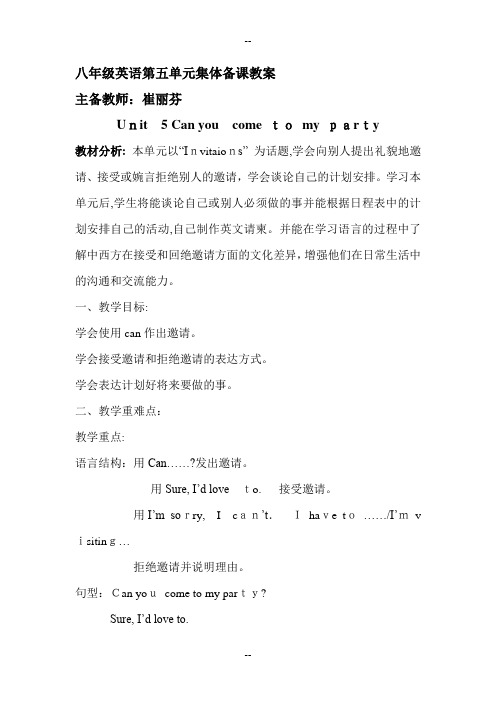
八年级英语第五单元集体备课教案主备教师:崔丽芬Unit 5 Can you come tomy party教材分析: 本单元以“Invitaions” 为话题,学会向别人提出礼貌地邀请、接受或婉言拒绝别人的邀请,学会谈论自己的计划安排。
学习本单元后,学生将能谈论自己或别人必须做的事并能根据日程表中的计划安排自己的活动,自己制作英文请柬。
并能在学习语言的过程中了解中西方在接受和回绝邀请方面的文化差异,增强他们在日常生活中的沟通和交流能力。
一、教学目标:学会使用can作出邀请。
学会接受邀请和拒绝邀请的表达方式。
学会表达计划好将来要做的事。
二、教学重难点:教学重点:语言结构:用Can……?发出邀请。
用Sure, I’d loveto. 接受邀请。
用I’m sorry,I can’t.Ihave to……/I’mv isiting…拒绝邀请并说明理由。
句型:Can youcome to my party?Sure, I’d love to.I’m sorry, I can’t. I have to ……教学难点;1. 使用Can……?发出邀请。
2. 使用Ihave to ……句型说明原因。
3.进行时表示未来计划。
三、情感、态度与价值观培养学生使用礼貌用语的能力,营造积极乐观的人际氛围,增进人与人之间的友谊,学会坦诚的与人相处,用英语交谈,培养交际能力,激发学生的主动性,激励学生自主学习。
四、课时设计:(5课时)Period 1: SectionA: 1a-2cPeriod2: SectionA: 3a-part4Period 3:Section B:1a-2c and part4Period 4: Section B: 3a-3cPeriod5:Revision and Selfcheck五、教学活动设计:本单元围绕“邀请和请求许可”这一话题,设计了三个任务型活动:Task1:对话展现提出邀请和接受邀请及拒绝邀请的英文表达。
人教版初二八年级英语上册 Unit 5 Can you come to my party 4 PPT课件

Read the conversations and then show the conversations
If you can’t go to the party, what shorry, I can’t. I have to …
I’m sorry, I can’t. I’m doing …
Listen, and write the names.
Tim, Ted, Kay, Anna, and Wilson
Tim Kay Anna Ted Wilson
Turn to page 87 , read the listening material. Then find the difficulties.
Can she come to my birthday party?
No, she can’t. She has to study for a test.
思考探究
• • • • • 1. have to 的用法:用have to 的适当形式填空: ① I_____ ______ go to the doctor. ② He _____ _____to play the basketball. ③You ______(not have)to worry about it. ④. Yesterday he _____ _____ go to the dentist, because he had a toothache. 归纳总结:have to 和其它的情态动词是否一样?它有无人称和数的 变化? _______________________________________________________ have to 的否定式是什么? ___________________________________ have to 后面跟什么成分? ___________________________________ 2.归纳总结: How to give reasons to say no to an invitation?请举两个例子: _______________________________________________ ________________________________________________
人教案 八年级 Unit 5 Can you come to my party

Unit 5 Can you come to my party?调兵山市六中沈冠楠Teaching aims:Knowledge: Master the key words and useful expressions.Ability: Get students to know how to make,accept and decline invitations.Know the usages of HAVE TO.Emotion: It’s polite to refuse one’s invitation if you can’t go. Importances and differences:Importances:Learn to make invitations with CAN and master the key words and expressions.Difficulties:How to make,accept and decline invitations and give reasons. Teaching procedures:Ⅰ.Warming-up1.Greeting students.2.Leading-in: Ask students some questions they’ve learnt before by showing somepictures. Can you swim/dance…? Yes,I can./No,I can’t.(Review the knowledge they learned before.)ⅡPre-task1.Teacher talk about the birthday and lead the invitation “Can you come to mybirthday party? ”Then give the answers “Yes, I’d love to(come)”“No, I’m sorry.”2.Ask students why they can’t come to the party. Present some reasons. (Master the key points better and get to know the new drills.)3.Pairwork: make a new conversation by inviting,accepting and refusinginvitations.4. Listening exercise and check the answers.(Improve student s’ speaking and listening abilities.)Ⅲ.While-task1.Group workFour students get into pairs. One student asks others if they can come to the party. The other students give the answers correctly.(Improve students’ cooperative ability.)petitionStudents stand up and speak out the meaning of the pictures in the screen as soon as they can. Find the fastest group.(Rise their interets of learning English.Listening exercise and check the answers.)3. Looking and speakingStudents make up a conversation with the key expressions according to the pictures. Then act out in front of the class.(Get the students to improve their oral English.)Ⅳ.Post-taskDo some exercises on the points.一、选择1)Can you come to my party ___ Sunday afternoon?A.inB.onC.atD.with2) I have to________for the math test.A.studyB.studyingC.learningD.studied3) ---I’m sorry, I can’t go to the movie with you.--- Oh, that’s too bad. Maybe ______ time.A. the otherB. otherC. anotherD. others二、用所给词的适当形式填空1)My father usually ___(take) a walk after dinner.2) She____ (have) a piano lesss now.3) I would love ___(come) to your party.4) I am sorry_____ (hear) that.5) Thank you for______(help) me.6) He_____(have) to go to the doctor.(Check whether they can master the importances and difficulties.)Ⅴ.Sum up1.Sum up the whole lesson with the knowledge tree.2.Homework: make a survey. Can your friends go to the movies on weekends? Thenwrite a report.(Check whether they can finish the task.)Blackboard disigning。
人教版英语八年级上册Unit 5听力原文及翻译(旧版)
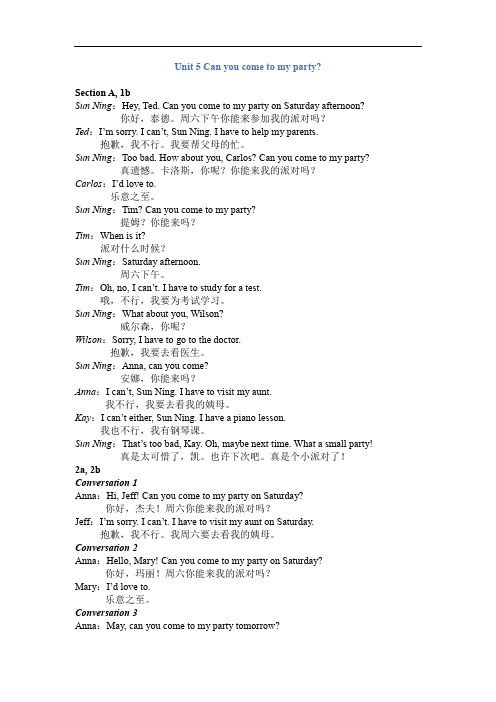
Unit 5 Can you come to my party?Section A, 1bSun Ning:Hey, Ted. Can you come to my party on Saturday afternoon?你好,泰德。
周六下午你能来参加我的派对吗?Ted:I’m sorry. I can’t, Sun Ning. I have to help my parents.抱歉,我不行。
我要帮父母的忙。
Sun Ning:Too bad. How about you, Carlos? Can you come to my party?真遗憾。
卡洛斯,你呢?你能来我的派对吗?Carlos:I’d love to.乐意之至。
Sun Ning:Tim? Can you come to my party?提姆?你能来吗?Tim:When is it?派对什么时候?Sun Ning:Saturday afternoon.周六下午。
Tim:Oh, no, I can’t. I have to study for a test.哦,不行,我要为考试学习。
Sun Ning:What about you, Wilson?威尔森,你呢?Wilson:Sorry, I have to go to the doctor.抱歉,我要去看医生。
Sun Ning:Anna, can you come?安娜,你能来吗?Anna:I can’t, Sun Ning. I have to visit my aunt.我不行,我要去看我的姨母。
Kay:I can’t either, Sun Ning. I have a piano lesson.我也不行,我有钢琴课。
Sun Ning:That’s too bad, Kay. Oh, maybe next time. What a small party!真是太可惜了,凯。
也许下次吧。
2019-2020年八年级英语上册 Unit5 Can you come to my party复习
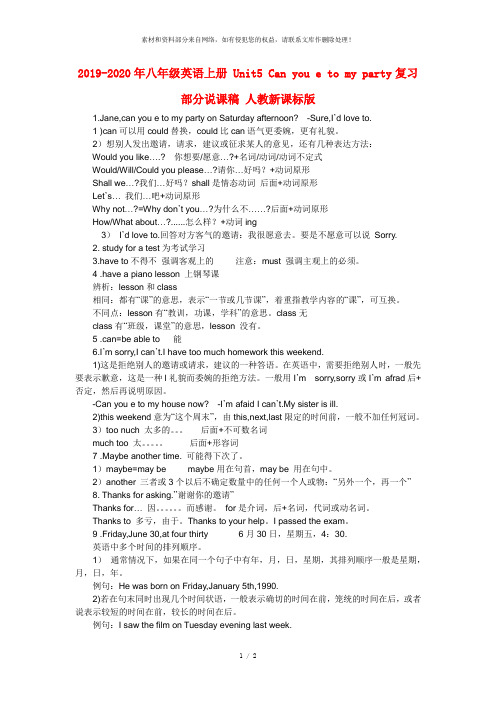
2019-2020年八年级英语上册 Unit5 Can you e to my party复习部分说课稿人教新课标版1.Jane,can you e to my party on Saturday afternoon? -Sure,I’d love to.1 )can可以用could替换,could比can语气更委婉,更有礼貌。
2)想别人发出邀请,请求,建议或征求某人的意见,还有几种表达方法:Would you like….? 你想要/愿意…?+名词/动词/动词不定式Would/Will/Could you please…?请你…好吗?+动词原形Shall we…?我们…好吗?shall是情态动词后面+动词原形Let’s…我们…吧+动词原形Why not…?=Why don’t you…?为什么不……?后面+动词原形How/What about…?......怎么样?+动词ing3)I’d love to.回答对方客气的邀请:我很愿意去。
要是不愿意可以说Sorry.2. study for a test为考试学习3.have to不得不强调客观上的注意:must 强调主观上的必须。
4 .have a piano lesson 上钢琴课辨析:lesson和class相同:都有“课”的意思,表示“一节或几节课”,着重指教学内容的“课”,可互换。
不同点:lesson有“教训,功课,学科”的意思。
class无class有“班级,课堂”的意思,lesson 没有。
5 .can=be able to 能6.I’m sorry,I can’t.I have too much homework this weekend.1)这是拒绝别人的邀请或请求,建议的一种答语。
在英语中,需要拒绝别人时,一般先要表示歉意,这是一种l礼貌而委婉的拒绝方法。
一般用I’m sorry,sorry或I’m afrad后+否定,然后再说明原因。
人教版英语八年级上册单词巧记句型语法剖析(Unit5Canyoucometomyparty)

初中英语学习材料madeofjingetieji八年级上册单词巧记+句型语法剖析Unit 5Can you come to my party三点剖析单词·巧记·典句·考点lesson []n.课;课程【巧记提示】les(s)更少+son(儿子)【经典例句】We’ll have an piano lesson.我们要上钢琴课。
【考点聚焦】1)注意和数词连用时的区别。
如:lesson 1=the first lesson 2)短语:teach sb.a lesson 给某人一个教训【活学活用】1.根据首字母和句意完成单词The girls have a drawing l on Monday.答案:lessonanother []adj.又一的;再一的【巧记提示】an(一个)+other(其他的)【经典例句】One person’s meat is another person’s poison.萝卜白菜,各有所爱。
【考点聚焦】1)同义词:2)短语:one...another... 一个……(两个以上中的)另一个【活学活用】2.选择—Sorry,—That’s too .MaybeA.bad;anotherB.bad;otherC.good;anotherD.good;other 答案:Apity []n可惜;遗憾;可惜的事【巧记提示】pity→city(城市【经典例句】It’s a pity你没来很遗憾。
【考点聚焦】1)惯用法:真遗憾!2)短语:feel pity for sb. 同情某人;out of pity 出于同情【活学活用】3.根据汉语意思完成句子—He can’—(真遗憾)!答案:What a pity!whole []adj整个的;全部的;完整的【巧记提示】w+hole(洞【经典例句】The whole整个事情都是由他粗心造成的。
【考点聚焦】all与whole都表示“全部”,但它们修饰名词时所处的位置不同。
八年级英语上册 Unit 5 Can you come to my party教材全梳理 人教新目标
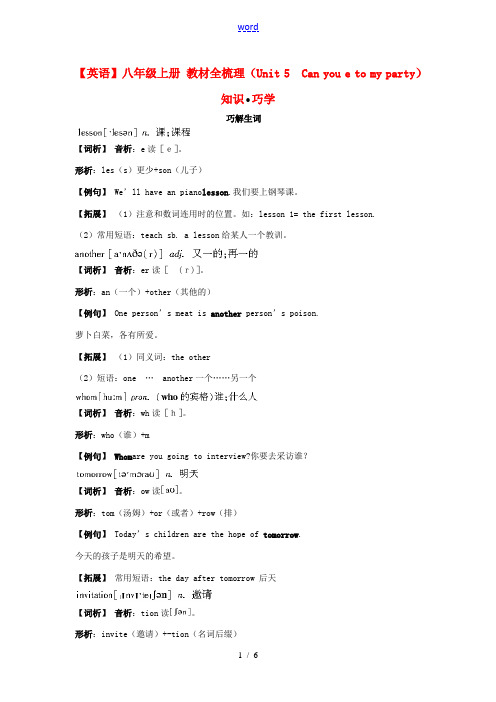
【英语】八年级上册教材全梳理(Unit 5 Can you e to my party)知识•巧学巧解生词【词析】音析:e读[e]。
形析:les(s)更少+son(儿子)【例句】We’ll have an piano lesson.我们要上钢琴课。
【拓展】(1)注意和数词连用时的位置。
如:lesson 1= the first lesson.(2)常用短语:teach sb. a lesson给某人一个教训。
【词析】音析:er读[(r)]。
形析:an(一个)+other(其他的)【例句】One person’s meat is another person’s poison.萝卜白菜,各有所爱。
【拓展】(1)同义词:the other(2)短语:one…another一个……另一个【词析】音析:wh读[h]。
形析:who(谁)+m【例句】 Whom are you going to interview?你要去采访谁?【词析】音析:ow读。
形析:tom(汤姆)+or(或者)+row(排)【例句】Today’s children are the hope of tomorrow.今天的孩子是明天的希望。
【拓展】常用短语:the day after tomorrow 后天【词析】音析:tion读。
形析:invite(邀请)+-tion(名词后缀)【例句】 Thanks for your invitation! 谢谢你的邀请!【拓展】(1)同根词:invite(2)常用短语:a letter of invitation 一封邀请信【词析】音析:i读[I]。
形析:形近词city【例句】It’s a pity that you did not e.很遗憾你没来。
【拓展】(1)惯用法:What a pity!真遗憾!(2)短语:feel pity for sb. 同情某人;out of pity出于同情【词析】音析:o读。
unit5 Can you come to my party

lesson concert another
教学后记/反思: 通过本节课的学习,学生能熟练使用目标语言去发出邀请,接受或委婉拒绝别人的邀请,在 Step5 Guessing game 中, 利用图片让学生用所学语言猜测图中人物不能参加聚会的原因, 学生发言很踊跃, 此环节充分调动了学生使用语言的积极性。在 Step6 Invitation and report 中,学生能够利用所学的 目标语言独立完成发出邀请任务,并能以报告的形式向全班同学汇报,此任务设计比较成功,完成效 果也较好。
是上好课的前提 写好教案是上好课的前提
学校:本溪市第二十二中学 学科:八年级英语 课题 Unit5 Can you come to my party? 授 课 时 间 :2010 年 9 月 27 日 授课教师:赵宇鹏 课型 New 课时 1
学情 分析
本课是新目标英语八年级 Unit5 Can you come to my party? 本单元主要内容是学习如何礼貌 地发出,接受,拒绝邀请。
这样表示拒绝的三种理由表达 法都呈现出来了,.下一步学生 就会使用以上三种句型来拒绝 邀请.
机械训练 此任务是学以致用,利用以上所 学来向对方提出或拒绝或接受 邀请,这样一来学生在使用目标 语中慢慢掌握了本节课重点内 容. 通过练习会话和游戏,操练和掌 握了第三人称的相关内容.
15 ’
17 ’
20 ’
邀请同学,然后汇报邀请结果,这 样学中用,用中学既练习如何发 出,接受和拒绝邀请,同时练习了 用第三人称汇报邀请结果.
30 ’
35 ’
40 ’ 板书设计: Unit5 Can you come to my party? Can you come to my party? Sure, I’d love to. Thanks for asking. Sorry,I can’t .I have to study for a test. I’m sorry , I can’t . I have to help my mother./go to the doctor. I’m sorry , I can’t. I’m playing soccer./going to the movies.
江西省九江市实验中学八年级英语上册《Unit 5 can you come to my party》教案 人教新目标版
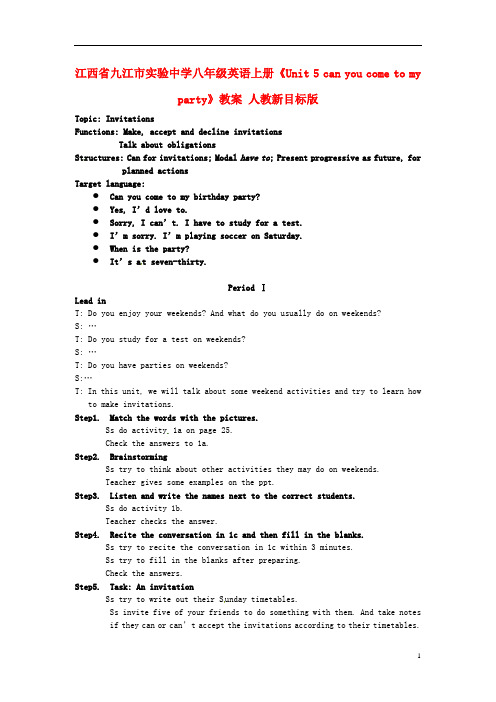
江西省九江市实验中学八年级英语上册《Unit 5 can you come to myparty》教案人教新目标版Topic: InvitationsFunctions: Make, accept and decline invitationsTalk about obligationsStructures: Can for invitations; Modal have to; Present progressive as future, for planned actionsTarget language:●Can you come to my birthday party?●Yes, I’d love to.●Sorry, I can’t. I have to study for a test.●I’m sorry. I’m playing soccer on Saturday.●When is the party?●It’s a t seven-thirty.Period ⅠLead inT: Do you enjoy your weekends? And what do you usually do on weekends?S: …T: Do you study for a test on weekends?S: …T: Do you have parties on weekends?S:…T: In this unit, we will talk about some weekend activities and try to learn how to make invitations.Step1.Match the words with the pictures.Ss do activity 1a on page 25.Check the answers to 1a.Step2.BrainstormingSs try to think about other activities they may do on weekends.Teacher gives some examples on the ppt.Step3.Listen and write the names next to the correct students.Ss do activity 1b.Teacher checks the answer.Step4.Recite the conversation in 1c and then fill in the blanks.Ss try to recite the conversation in 1c within 3 minutes.Ss try to fill in the blanks after preparing.Check the answers.Step5.Task: An invitationSs try to write out their S unday timetables.Ss invite five of your friends to do something with them. And take notesif they can or can’t accept the invitations according to their timetables.Useful expressions:Can you …?Sure. I’d love to.Sorry, I can’t. I will …I’m sorry. I have to ….I’d love to, but I have to …I’m sorry. I’m going …Maybe another time. (Maybe next time.)Thanks for asking.Make a conclusion:Ss try to make a conclusion according to their survey.Period ⅡStep1. Listen and circle “can” or “can’t”.Ss try to listen to the conversation and then circle the correct words. Check the answer s.Step2. Listen and number the reason 1-3.Ss try to do activity 2b on page 26.Check the answers.Step3: Discuss: How to make, accept and decline invitations.Teacher asks students to summarize how to make, accept and decline invitations.Teacher summarizes them on ppt.Step4. Read the invitation.Ss do activity 3a on page 27.Check the an swers.Step5. Pairwork.Fill in the card with details of an event on page 27.Give an example.Step6. Task1: My invitation card.Ss make invitation cards by themselves.Ss try to find out whose card is the most beautiful one; the most attractiveone; the simplest one; the most creative one.Step7: Task2: Our great time.Ss write out their weekend timetable.Ss try to find a time when they and th eir partners can both go to the mall.Period ⅢStep1. Write the dates for the week.Ss do activity 1a o n page 28.Check the answers.Step2. Write the words below the correct dates.Ss do activity 1b on page 28.Check the answers.Step3. Tell the difference between dates and weekdays.Ss try to summarize how to ask the dates and weekdays.Ss try to practice the conversations of dates and weekdays.Step4. Listen and circle Yes or No.Ss try to do activity 2a on page 28.Check the answers.Step5. Listen and match the days with Vince’s Activities.Ss do ac tivity 2b on page 28.Check the answers.Step6. Task: Will you go to my party?Ss work in groups to design an invi tation card to invite their classmates to join the party in your group.Ss read their invitations in class.Ss vote to find out which party that most students want to join.Teacher gives some examples.Period ⅣStep1. Read and complete.Ss read the e-mail message and then complete the calendar on page 29.Check the answers.Step2. Fill in the blanks in the e-mail message.Ss do activity 3b on page 29.Check the answers.Step3. Task: I can’t visit next week.Ss fill in the timetable.Ss try to write the e-mail message according to the timetable.Step4. Summarize the grammar of this unit.Ss try to summarize the grammar of this unit.Teacher explains the grammar for students.Step5. Self-checkSs do self-check 1 on page 30.Check the answers.Step6. Write replies to the invitations.Ss do activity 2 in self-check on page 30.Period ⅤExercise:1.Work book.2.Test book.3.Words and phrases of unit 2.。
八年级上_Unit_5_Can_you_come_to_my_party

• 课堂跟踪练习-单项选择 ( B)1.---Can you come to my birthday?---____. A. Yes,I can’t. B.Sorry, I can’t. C.No,I can. D.Sorry,I can. ( A )2. ---Can you come to my house? ---Sure,___ . A.I’d love to. B.I’d love C.I’d like. D.I can’t ( A )3.I’m too tired,so I ___ sit down and rest every five minutes. A. must B.must to C.have D.have to ( C )4.I’d love___shopping with my mother. A.going B.goes C.to go D.went ( D ) 5.I already had to___ when I was your age. A.working B.to work C.works D.work
Yes/Sure,I’d love/like to. Sorry,Ican’t. I have to help my parents.
其他表邀请的句型:
1) Could /Will/Would you come to the party?
2) Would you like /love to come to the party?
• 3) others=other + n. (pl.) ,无范围的另一些 some…others…. “一些……另一些…….” • eg. Lei Feng was always ready to help others(=other + people) • 4) the others=the other + n. (pl.) ,有范围的另 外一些, “其余所有的” eg. There are sixtytwo students in our class, one third are girls, the others (=the other students) are boys.
八年级英语unit 5 can you come to my party 通用版知识精讲

初二英语Unit 5 Can you come to my party? 通用版【本讲主要内容】Unit 5 Can you come to my party?通过本课的学习,我们应该能做下面的事:1. 学会礼貌地发出、接受、拒绝邀请。
2. 谈论自己或别人必须做的事情。
3. 学习根据日程表中的计划安排自己的活动。
4. 学习can及其它情态动词的用法。
【知识掌握】【知识点精析】同学们,你们的课余时光是怎样度过的呢?你都有一些什么样的课余生活呢?你有没有邀请过你的好友一起看电影、打球、听音乐会或者参加聚会呢?相信你通过第五单元的学习,一定可以用准确的英语熟练地表达你的这些想法。
【词汇用法】1. lesson n. 功课、课程We had a history lesson at school this morning. 我们今天早上在学校上了一堂历史课。
an English lesson=a lesson in English 英语课give lessons in drawing 上绘画课lesson与class的区别lesson课程(更强调上课的内容);class班级(更强调上课的环境)We have four lessons in the morning and two in the afternoon. 我们上午有4节课,下午有2节。
She was in a class of thirty students. 她在一个有30个学生的班里。
2. invitation n. 邀请I have received an invitation to their party. 我收到了他们宴会的请贴。
make invitations 发出邀请accept invitations 接受邀请decline invitations 拒绝邀请invite v. 邀请Thank you for inviting me. 谢谢你的邀请。
- 1、下载文档前请自行甄别文档内容的完整性,平台不提供额外的编辑、内容补充、找答案等附加服务。
- 2、"仅部分预览"的文档,不可在线预览部分如存在完整性等问题,可反馈申请退款(可完整预览的文档不适用该条件!)。
- 3、如文档侵犯您的权益,请联系客服反馈,我们会尽快为您处理(人工客服工作时间:9:00-18:30)。
八年级英语上册 Unit5《Can you come to my party》单元检测人教新目标版提示:请将所有试题的答案填在答题纸上。
一、语音(共5小题;每小题1分,满分5分)从A、B、C、D四个选项中选出划线部分读音与其它三个不同的一个,并将其字母代号填入答题纸相应题号的括号内。
()1.A. same B. late C. have D. gate()2. A. my B. fly C. bye D. any()3. A. yes B. very C. yours D. young()4. A. come B. some C. home D. son()5.A. how B. town C. now D. window二、单项选择(共25小题,每小题1分,满分25分)从A、B、C、D四个选项中,选出可以填入空白处的最佳选项,并将其字母代号填入答题纸相应题号的括号内。
()6. 一What’s on your desk, Cathy?一There’s _____ interesting book about animals.A. aB. anC. theD./( ) 7. We have no time to play. We have ______ homework to do.A. too muchB. much tooC. too manyD. many too( ) 8. Can you________ my house to have a meeting tonight?A. come over toB. come back toC. leave forD. have a look at( )9 . Thanks for ______ me to your party.A. inviteB. invitesC.to inviteD. inviting( ) 10. — Can you go to the concert with me this afternoon?— Yes, ______.A. I’d likeB. I’d love toC. I would loveD. Yes, I do( ) 11. They often play ______ after school.A. the soccerB. tennisC. a volleyballD. basketballs ( ) 12. I’m going to the mov ies ______ my friends.A.toB. andC. orD. with( ) 13. — Can you come to my party on Sunday?—______, I can’t. I have to go to the doctor’s.A. YesB. SureC. SorryD. Not( ) 14. ______ telling me the news.A. Thanks you forB. Thanks forC. Thank youD. Thank( ) 15. I’m sorry, ______ I can’t go to the movies with you.A. andB. soC. orD. but( ) 16. —What’s Susan doing? —She’s ______ her sister.A.babysitB. babysitsC. babysitting( ) 17. Emma, come here. Here ______ an apple for you.A. isB. areC. haveD. has( ) 18. They arrived there ______ cold Sunday afternoon.A. to theB. on aC. in aD. at a( ) 19. ______ is between Tuesday and Thursday.A. WednesdayB. FridayC. MondayD. Sunday( ) 20. I have to________for the math test.A.studyB.studyingC.learningD.studied( ) 21.You can see many good programs ______TV.A.on theB.over theC.over D .on( ) 22. Please practice________ English every day.A. speakB. to speakingC. speakingD. to speak( ) 23. ---____ I watch TV now. Mum--- Sure, but you___ finish your homework first.A. Must; needn'tB. Can; mayC. Can; mustD. May; mustn't( ) 24. I don’t like the color of the T-shirt. Would you show me __________one?A. otherB. the otherC. anotherD. others( ) 25. __________ me carefully, boys and girls. Can you _____________me?A. Listen to; hear fromB. Hear; listen toC. Hear; hearD. Listen to; hear( ) 26. --- Do you want to go to the cinema with me ?--- Sorry, I am busy ______ midnight.A. toB. tillC. fromD. /( ) 27. One of my best friend ________ going to _______ me next month.A. is; comeB. is; visitC. are; playD. are; enjoy ( ) 28. Our school is only ___________ walk from here.A. five-minuteB. five minute’sC. five minutesD. five minutes ( ) 29. I didn’t go to bed _______ my father came back late last night.A.soB. untilC. thoughD. although( ) 30. Whose shirt is this ? It ____be li lei’s. It is too big for himA couldB mustC can’tD might三、完型填空(10分,每小题1分)Mary is 31 American schoolgirl. Now she is in Beijing 32 her parents. Marydoesn’t know Chinese, 33 she is studying Chinese. She often 34 Chinese to her Chinese friends. Sometimes they don’t understand her because she can’t speak Chinese 35 .It’s Sunday mornin g. She is walking in the street. She 36 to go to the zoo to __37 elephants and monkeys, but she doesn’t know 38 to go there. She asks a Chinese boy. The boy can’t understand her. Then she takes out a pen and a piece of paper. She draws an elephants on it , and 39 the picture to the boy. The boy understands now ,then he shows Mary the 40 to the zoo.( ) 31. A. a B. an C. the D. /( ) 32. A. by B. with C. about D. in( ) 33. A . and B. or C. but D. so( ) 34. A. speaks B. tells C. says D. talks( ) 35. A. good B. well C. nice D. fine( ) 36. A. lets B. has C. wants D. helps( ) 37. A. see B. look C. find D. watch( ) 38. A. when B. how C. where D. which( ) 39. A. reads B. passes C. gets D. shows( ) 40.A. way B. road C. street D. picture四、阅读理解。
(10分,每题1分)AEinstein was an American scientist. One day he was walking in the street in New York. His friend met him, “Einstein, you should buy a new coat. Look, how old your coat is!” But Einstein answer ed, “It doesn’t matter. Nobody knows me here.”After a few years Einstein became a famous scientist. But he stil l(仍)weared the old coat. His friend met him again and asked him to buy a new one.But he said, “I needn’t buy a new coat. Everyone knows me here.”( )41. Einstein was _______ scientist.A. an EnglishB. a FrenchC. an AmericanD.a Chinese( )42. Einstein’s coat was very old. His friend ________.A. gave him a new oneB. askedhim to buy a new oneC. helped him buy a new oneD. asked him to throw it( )43. Einstein did n’t want to buy a new one because_______.A. nobody knew himB. he liked the old coatC. he did n’t mind itD.he had no money( )44. A few years later Einstein___________.A. became (成为) a great scientistB.still wore the old coat C. bought a new coatD. A and B( )45. Which of the following sentences is right?A. Einstein did n’t buy a new coat at last.B. Einstein bought a new coat for himself.C. E instein’s friend bought a new coat for him.D. Einstein borrowed a new coat.BIt was Jimmy’s birthday and he was five years old. He got a lot of nice birthdaypresents(礼物) from his family, and one of them was a beautiful drum.( 鼓 )“ Who gave him that thing?” Jimmy’s father asked when he saw it. “ Hisgrandfather did,” answered Jimmy’s mother. “ Oh,” said his father. Of courseJimmy liked his drum very much. He made a terrible noise (噪音)with it, but his fatherd idn’t mind . He was working during the day and Jimmy was in bed when he got homein the evening , so he couldn’t hear the noise.But one of the neighbors ( 邻居) didn’t like the noise at all, so a few dayslater, she took a sharp ( 锋利的 ) knife and went to Jimmy’s house while he washitting his drum. She said to him, “ Hello, Jimmy, do you know, there is somethingnice inside your drum? Here is a knife. Open the drum and let’s find it.”( )46. Jimmy got a lot of nice presents from his ___.A classmatesB friends C. teachers D. family( ) 47. Who gave Jimmy the drum?A His fatherB His motherC His neighborD His grandfather( ) 48. Why did Jimmy’s father not stop (阻止)him from making noise with thedrum? Because _____.A he liked Jimmy very much.B he didn’t mind.C Jimmy was in bedD Jimmy only played in the evening( ) 49. One of the neighbors _________.A liked Jimmy very much.B enjoyed listening to the sound of the drumC wanted to show Jimmy a sharp knife.D didn’t like the noise at all( ) 50. What did Jimmy’s neighbor really want him to do? To ___________.A stop him making noisesB make a noise on his drum with a knifeC show him how to hit the drumD find something nice in his drum五、改错(10分,每空1分)()51. --- Can you come to my birthday party tonight ?A B--- Sure, I would.C D( ) 52. P eter can’t join us because he have to take care of his mother.A B C D( ) 53. Marie is fishing with Grandpa whole the day.A B C D( ) 54. --- What are you doing ?A B--- I am studying about my math test.C D( ) 55. Emilio is smart than any other boy in our class.A B C D六、正确的词形填空。
